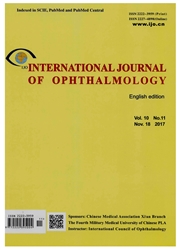

 中文摘要:
中文摘要:
AIM: To identify the genetic defects in a Chinese family with achromatopsia.·METHODS: A 2.5-year-old boy, who displayed nystagmus, photophobia, and hyperopia since early infancy, was clinically evaluated. To further confirm and localize the causative mutations in this family, targeted region capture and next-generation sequencing of candidate genes, such as CNGA3, CNGB3, GNAT2,PDE6 C, and PDE6 H were performed using a custom-made capture array.·RESULTS: Slit-lamp examination showed no specific findings in the anterior segments. The optic discs and maculae were normal on fundoscopy. The unaffected family members reported no ocular complaints. Clinical signs and symptoms were consistent with a clinical impression of autosomal recessive achromatopsia. The results of sequence analysis revealed two novel missense mutations in CNGA3, c.633T>A(p.D211E) and c.1006G>T(p.V336F), with an autosomal recessive mode of inheritance.·CONCLUSION: Genetic analysis of a Chinese family confirmed the clinical diagnosis of achromatopsia. Two novel mutations were identified in CNGA3, which extended the mutation spectrum of this disorder.
 英文摘要:
英文摘要:
AIM: To identify the genetic defects in a Chinese family with achromatopsia. METHODS: A 2.5 -year -old boy, who displayed nystagmus, photophobia, and hyperopia since early infancy, was clinically evaluated. To further confirm and localize the causative mutations in this family, targeted region capture and next -generation sequencing of candidate genes, such as CNGAS, CNOBS, aN,472, PDESC, and PDESH were performed using a custommade capture array. RESULTS: Slit-lamp examination showed no specific findings in the anterior segments. The optic discs and maculae were normal on fundoscopy. The unaffected family members reported no ocular complaints. Clinical signs and symptoms were consistent with a clinical impression of autosomal recessive achromatopsia. The results of sequence analysis revealed two novel missense mutations in CNGA. 7, c.6331->A (p.D211E) and c.1006G>T (p.V336F), with an autosomal recessive mode of inheritance. CONCLUSION: Genetic analysis of a Chinese family confirmed the clinical diagnosis of achromatopsia. Two novel mutations were identified in ONGA.?, which extended the mutation spectrum of this disorder.
 同期刊论文项目
同期刊论文项目
 同项目期刊论文
同项目期刊论文
 Surgical induced astigmatism correlated with corneal pachymetry and introcular pressure: transconjun
Surgical induced astigmatism correlated with corneal pachymetry and introcular pressure: transconjun 期刊信息
期刊信息
